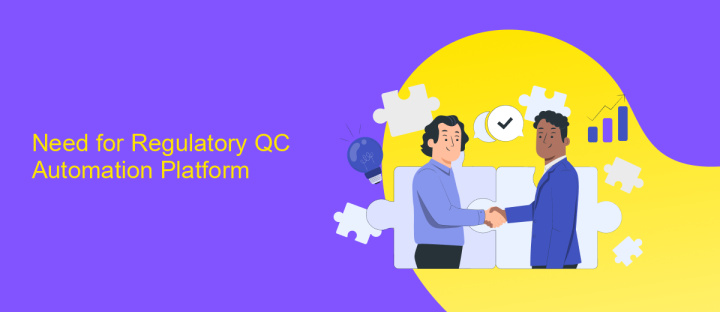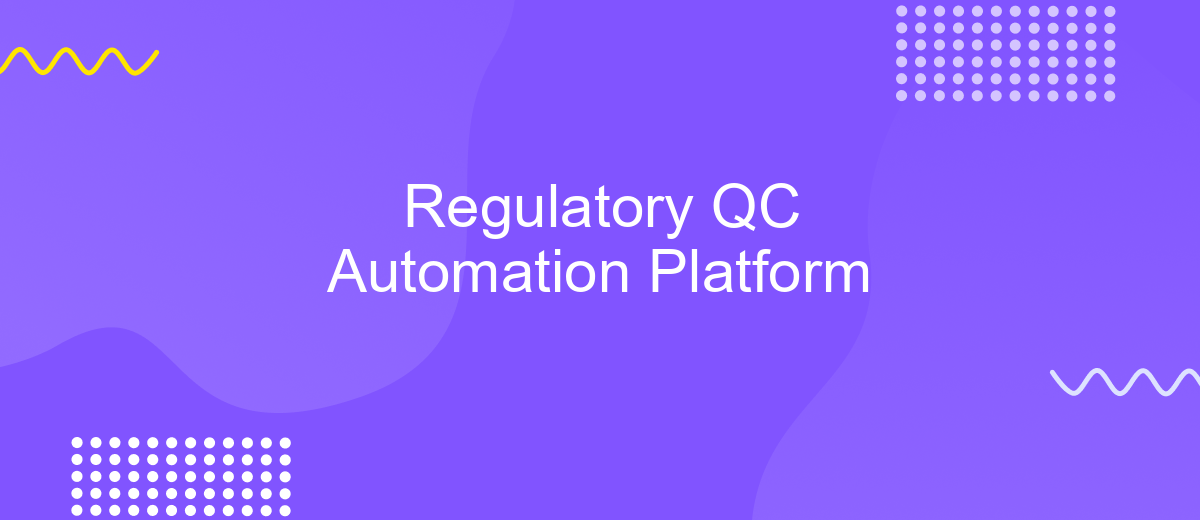Regulatory QC Automation Platform
In today's rapidly evolving regulatory landscape, maintaining compliance while ensuring quality control can be a daunting task for organizations. The Regulatory QC Automation Platform emerges as a solution, streamlining compliance processes and enhancing efficiency. By automating quality control tasks, this innovative platform reduces human error, accelerates workflows, and ensures adherence to regulatory standards, ultimately empowering organizations to focus on growth and innovation.
Introduction
In the rapidly evolving landscape of regulatory compliance, the demand for efficient and reliable quality control (QC) processes has never been more critical. Organizations face increasing pressure to adhere to stringent regulations while maintaining operational efficiency. The emergence of Regulatory QC Automation Platforms offers a transformative solution, enabling businesses to streamline their compliance workflows and enhance accuracy. By automating repetitive tasks, these platforms allow companies to allocate resources more effectively and focus on strategic initiatives.
- Improved accuracy and consistency in QC processes.
- Time-saving through automation of routine tasks.
- Enhanced resource allocation and operational efficiency.
- Scalability to adapt to evolving regulatory requirements.
- Reduction in human error and manual oversight.
The integration of Regulatory QC Automation Platforms is not merely a technological advancement but a strategic imperative for businesses aiming to thrive in a competitive environment. By leveraging these platforms, companies can not only ensure compliance with current regulations but also gain a competitive edge by proactively adapting to future regulatory changes. As the regulatory landscape continues to evolve, embracing automation in QC processes will be a key differentiator for forward-thinking organizations.
Need for Regulatory QC Automation Platform

In today's fast-paced regulatory environment, organizations face increasing pressure to ensure compliance with complex quality control (QC) standards. Manual processes are no longer sufficient to manage the vast amounts of data and documentation required for regulatory QC. This is where a Regulatory QC Automation Platform becomes essential. By automating routine tasks, such platforms enhance accuracy and efficiency, reducing the risk of human error and ensuring that all compliance requirements are consistently met. They also enable real-time monitoring and reporting, allowing organizations to quickly identify and address any compliance issues.
Furthermore, the integration of such platforms with existing systems is crucial for seamless operations. ApiX-Drive, for instance, offers an effective solution for automating integrations, ensuring that data flows smoothly between different applications and systems. This not only saves time but also enhances the overall efficiency of the QC process. By leveraging advanced automation tools, organizations can focus more on strategic decision-making rather than being bogged down by tedious manual tasks, ultimately leading to improved compliance and operational excellence.
Benefits of Regulatory QC Automation Platform

Implementing a Regulatory QC Automation Platform can significantly enhance the efficiency and accuracy of quality control processes within regulatory frameworks. By automating repetitive and time-consuming tasks, organizations can ensure compliance with industry standards while reducing the risk of human error. This advanced technology streamlines operations, allowing regulatory teams to focus on more strategic initiatives.
- Improved Accuracy: Automation reduces the likelihood of errors, ensuring data integrity and compliance with regulatory standards.
- Increased Efficiency: Streamlining QC processes saves time and resources, allowing teams to allocate efforts to higher-value tasks.
- Cost Reduction: By minimizing manual interventions, organizations can lower operational costs and improve overall productivity.
- Scalability: The platform can easily adapt to growing business needs, supporting larger data volumes and more complex regulatory requirements.
- Enhanced Reporting: Automated systems generate comprehensive reports, providing insights and facilitating informed decision-making.
In conclusion, a Regulatory QC Automation Platform not only optimizes quality control operations but also supports regulatory compliance and business growth. By embracing automation, companies can stay ahead in a competitive landscape, ensuring they meet evolving regulatory demands efficiently and effectively.
Implementation and Challenges

Implementing a Regulatory QC Automation Platform involves integrating advanced technologies to streamline quality control processes. The initial phase requires a thorough assessment of existing workflows to identify areas for automation. This assessment aids in designing a customized platform that aligns with regulatory standards and organizational needs. Collaboration between IT, quality assurance, and regulatory teams is crucial for successful deployment.
Despite its benefits, implementing such a platform presents several challenges. Organizations must address data security concerns, ensuring compliance with stringent regulatory requirements. Additionally, the transition from manual to automated systems can be complex, requiring significant change management efforts.
- Ensuring seamless integration with existing systems
- Maintaining data integrity and accuracy
- Training staff to adapt to new technologies
- Managing ongoing maintenance and updates
Overcoming these challenges demands a strategic approach, involving continuous monitoring and iterative improvements. Organizations should invest in robust training programs and maintain open communication channels to facilitate the transition. Ultimately, a well-implemented Regulatory QC Automation Platform can enhance efficiency, reduce errors, and ensure compliance, providing a competitive edge in the regulatory landscape.
Future of Regulatory QC Automation
The future of regulatory QC automation promises significant advancements driven by emerging technologies and evolving industry needs. With the integration of artificial intelligence and machine learning, QC automation platforms will become more sophisticated, offering predictive analytics and real-time monitoring capabilities. These advancements will enable organizations to anticipate compliance issues before they arise, ensuring a proactive approach to quality control. Furthermore, the use of blockchain technology is expected to enhance data security and transparency, making regulatory processes more reliable and efficient.
As the demand for seamless integration of various systems grows, platforms like ApiX-Drive will play a crucial role in streamlining these processes. ApiX-Drive offers a user-friendly interface for setting up integrations without requiring extensive technical knowledge, allowing businesses to connect their QC automation tools with other essential systems effortlessly. This capability will be vital in creating a cohesive ecosystem where data flows seamlessly, reducing manual errors and enhancing overall efficiency. As regulatory landscapes continue to evolve, the ability to adapt quickly through automated solutions will be a key differentiator for businesses striving to maintain compliance and quality standards.
FAQ
What is a Regulatory QC Automation Platform and how does it work?
How does automation improve regulatory quality control?
What are the key features to look for in a Regulatory QC Automation Platform?
How can businesses integrate a Regulatory QC Automation Platform with their existing systems?
What industries benefit the most from using a Regulatory QC Automation Platform?
Time is the most valuable resource for business today. Almost half of it is wasted on routine tasks. Your employees are constantly forced to perform monotonous tasks that are difficult to classify as important and specialized. You can leave everything as it is by hiring additional employees, or you can automate most of the business processes using the ApiX-Drive online connector to get rid of unnecessary time and money expenses once and for all. The choice is yours!

